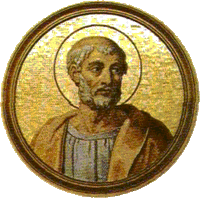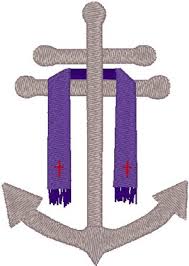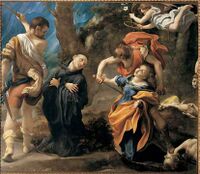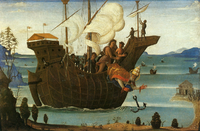Pope Clement I
Pope Clement I is best known for his oranges and a forgiving nature (from where we get the noun 'clemency'). He was elected Pope in a secret meeting in the catacombs of Rome. Later Christians say he was 'handsome' and a man who shone beatitudes out of every orifice.
Clement also left a cache of letters behind that were later considered to be 'semi-divine' as he had known Saint Peter and had spent time with the Virgin Mary at her retirement home in Asia Minor. Clement was therefore considered to be an authority on Christianity and apparently knew what he was talking about.
Early Career[edit]
The Papal records of that time haven't survived except for one wildly inaccurate chronicle known in English as 'The Fanciful Lives of the Popes' (Liber Faker Pontificalis in Latin). It includes stories of Popes mud wrestling with their opponents over issues of doctrinal differences, talking dragons and the shoe size of every Pope. The entry for Pope Clement I says he worked as a civil servant in Rome where he met Saint Peter who was residing in one of Emperor Nero's jails. Saint Peter urged Clement to join the Christians or face an eternal torment of burning. Clement chose the former and rapidly rose up the ranks as other Christians were caught and thrown to the lions.
His Works[edit]
Clement appears to be the first one to start working on the Papal archives which had lain around unsorted for 40 years. The Christians had been working on the original promise that Jesus Christ would return shortly and pass a final judgement. So keeping mundane things like names and addresses and subscription lists seemed to be a minor point. Clement changed this and is considered to be the founder of Papal Red Tape.
Relation to the Emperors[edit]
An alternative origin story for Clement was that he was actually someone called Flavius Clemens, first cousin of emperor Domitian. This story was used by later Christians to prove that their religion wasn't just for credulous idiots, slaves, women and criminals. Flavius Clemens had been a high born Roman with an expensive villa. He was later executed by Domitian for treason but this was later changed and that he had secretly come out as a Christian. Whatever the truth in all of this, it was believed and was said to be the reason why Clement could write such wonderful letters in perfect Latin.
Letters[edit]
Pope Clement's letters to other churches have survived. They talk about the connections between Rome and other Christians in the eastern half of the country. In particular, there was a lot of writing to and from Corinth on a matter of personal hygiene exhibited by the local clergy there. The local bishop Polycrap hadn't washed for 10 years and was giving the local Christians a very stinky reputation. Clement confirmed that keeping clean was also a Christian virtue and that visiting a bathhouse was necessary, even if it was full of Pagan altars and statues. When this was disputed, Clement promised to come over in person and scrub down Bishop Polycrap.
Other letters credited to Clement included A Joke about Two Virgins and a Bishop, Second Clementine Letter to the Corinthians (bar of soap attached) and a song, Oh My Darling Clementine.
Death[edit]
Clement is reported to have died in Greece either in Corinth or Athens. Tradition is that he died a martyr in the personal hands of emperor Trajan after he refused blaspheme against Jesus. Perhaps Clement had made a disparaging remark about Poseidon (A.K.A. Neptune) and the emperor took exception. Clement died after he was tied to anchor and tossed out to sea to drown. It made Clement a saint, albeit a drowned one..
Clement's body was claimed after death and divided up to be used as holy relics in a number of churches. Such was the way of God. He became a favourite of sailors who would invoke his name if they went overboard. The smarter ones got the anchor tattooed on their bodies.
| Preceded by: Anacletus |
List of Popes 88 AD - 99 AD |
Succeeded by: Evaristus |




